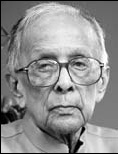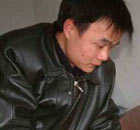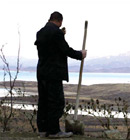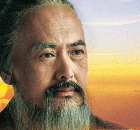Newsmaker
Communist who could have been Indian PM dies at age 95
(China Daily)
Updated: 2010-01-18 08:57
 |
Large Medium Small |
NEW DELHI: Veteran Marxist leader Jyoti Basu died yesterday in a Kolkata hospital yesterday. He was 95.
His pragmatic politics twice saw him coming close to becoming prime minister.
Basu's death is seen as a possible blow to unity among a disparate group of communists who face a tough election next year in the eastern state of West Bengal, a traditional leftist stronghold.

"Jyoti Basu played the role of the elderly patriarch, whose more mature, considered view and his ability to retain the broad base of support were very important," political analyst Mahesh Rangarajan said.
Basu, who had suffered multiple-organ failure, had been on a temporary pacemaker since late last night.
Union Home Minister P Chidambaram, who was in Kolkata, said: "He strode like a colossus on the Indian political scene for several decades. He was a great patriot, a great democrat. He lived a full life."
Basu, a widower, leaves behind his only son, Chandan.
A charismatic leader, he served as West Bengal Chief Minister from June 1977 until November 2000, heading five successive Left Front governments. Prime Minister Manmohan Singh described him as "a great son of India" on his visit to Kolkata on Saturday.
The Communist Party of India (Marxist) (CPI-M) veteran helped prop up four coalition regimes in New Delhi despite never venturing beyond the state assembly himself.
Basu reached the zenith of his political career in 1996, when a combination of parties formed the national United Front and unanimously asked Basu to lead the federal government as prime minister.
However, the CPI-M declined the offer, saying it would not head a national government whose policies it would not be able to control.
Basu also adroitly played the kingmaker's role. He helped stitch together coalition governments led by V.P. Singh in 1989, H.D. Deve Gowda in 1996 and I.K. Gujral in 1997.
In 2004, Basu and another CPI-M stalwart Harkishan Singh Surjeet pushed leftist parties to lend outside support to the Congress-led United Progressive Alliance (UPA) government of Manmohan Singh.
Born on July 8, 1914, in Kolkata, Basu became a barrister at London's Lincoln Inn. He embraced Communism after coming into close contact with British Communist leaders like Harry Pollitt and Rajani Palme Dutt.
On returning to India, Basu became a whole-timer of the Communist Party of India (CPI) and worked among railway workers. He won his maiden election to the Bengal Legislative Assembly in 1946 from the railway constituency. Basu quickly emerged as the opposition's most effective voice in the House.
After India's independence, Basu was elected to the state Legislative Assembly 11 times.
When the CPI split in 1964, Basu became one of the founding leaders of the CPI-M.
In 1967 and 1969, Basu was deputy chief minister of consecutive United Front governments.
His government was credited with restoring political stability and bringing in land reforms that gave poor farmers an opportunity to have their own holdings. But he was accused of failing to stand up to powerful trade unions, which resisted his attempts to bring in foreign investment and rejuvenate local industry.
His opportunity to become prime minister came in 1996 when a federal coalition was cobbled together by some leftist, lower caste and regional parties.
Many felt his lengthy experience in holding together a leftist coalition in Bengal would be invaluable in controlling an often-fractious grouping at the federal level. But Basu's party, the CPI-M, supported the coalition from outside and did not join the government.
Some commentators believed that if he had become prime minister, it might have prevented the Hindu nationalist Bharatiya Janata Party from coming to power.
Often described as a Fabian Socialist rather than an orthodox Communist, Jyoti Basu worked by consensus, successfully managing coalitions, while showing a healthy respect for the viewpoints of others.
The only election he lost to the assembly was in 1972. He became the chief minister five years later, heading the first Left Front government.
Under Basu's leadership, the Left Front government brought about agrarian reforms through Operation Barga. It also successfully pursued the devolution of power to local rural bodies or panchayats. And it introduced various relief measures and experimented in agricultural development through government support for small holdings.
Basu stepped down for health reasons in November 2000. But as a CPI-M Politburo member, he continued to play a big role in the party and national politics.
Reuters, BBC, IANS, PTI and CNN-IBN






